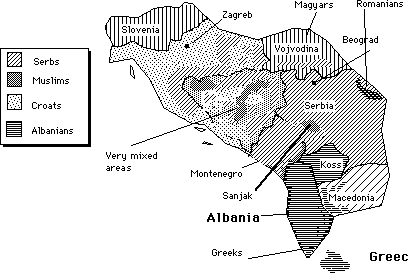|
|
|
|
|||
|
|
|
|
|
 |
|
At the time of the later Roman Empire the ancestors of the Albanians (Illyrians who supplied many of the most famous Roman emperors, such as Diocletian, Constantine and Justinian) were the main inhabitants of this area. The most famous general in the time of Justinian was Belisarius - probably an Illyrian, born in what is now Bulgaria. The migrations of the Slav peoples into eastern Europe in the space between the Latin Empire of the West and the Byzantine Empire of the east might have produced a single Slav-speaking empire from Russia to the Adriatic. What split off the southern Slavs from the mainstream was the arrival of the Magyars from Central Asia into Hungary, cutting off the southerners from the Czechs and Slovaks. Gradually the languages have diverged. However, what distinguishes the Croats from Serbs is the religions, as the Serbs were converted from Byzantium and the Croats from Rome. Otherwise they share the language. By standards used in other parts of the world the Muslims also are only a religious division. �When the area had been part of the Ottoman Empire there had been other groups. There had been communities of Turks. These were forced to leave in an early 20th century version of ethnic cleansing, after the Slavic states became independent. During the Ottoman period people lived peacefully with each other in such cities as Salonika (now in Greece). If the "ethnic" groups did not hate each other so much the land might be divided into autonomous local government areas (Cantons) on the lines of Switzerland. Even then most areas had mixed villages and even mixed families (Croats and Serbs speak Serbo-Croat, the spoken language being the same, and the Muslims also). In better times people less attached to religion and to the national myths found they could marry each other, especially in Bosnia. As in Northern Ireland some hoped that eventually the myths would retreat into the status of colorful folklore while people got on with each other peacefully. But it seems that not enough Serbs and Croats married each other. Also as in Northern Ireland the failure of the economy is probably a factor: fully employed people have no time or need for nationalist fantasy. Bosnia-Herzegovina was especially mixed, with Serbs, Croats and Muslims living for the most part in mixed villages and especially in the city of Sarajevo. The Muslims were a majority. Ethnic cleansing has changed this. Who is to blame for the war and disturbances? It is too soon even to try to judge. The Croat government demanded the sovereignty of the whole area given to Croatia by Tito when he laid out the structure of federal Yugoslavia. They ignored the wishes of the Serb minority (Knin and Eastern Slavonia) and their fears of the wartime Croat past (Ustashe). As long as the frontiers were no more than convenient local government divisions they were acceptable, but not as international borders. The Serbs of Serbia, or at least their demagogic president the late Slobadan Milosevic, made demands that ignored the wishes of the Croats who live in the areas they claimed as Serbian. They practiced ethnic cleansing which reminded outsiders of the Nazis. The Serbian government also stoked the fires of conflict in Kosovo, an area which was almost wholly Albanian in language. The local Serbs gradually moved out from a poor area during the 20th century and the Albanians have had a higher birthrate. Serbian Nationalist mythology claims it is an "inalienable" part of Serbia. However, it seemed much more likely to become a part of Albania, after a nasty war, unless common sense intervened. There is little of that in the area. The war duly happened and Kosovo is no longer effectively ruled by Serbia. It remains in effect a Protectorate of the EU and UN. Independence has been declared, though the real power belongs to the "peacekeeping"forces of the EU. On the borders of Montenegro and Serbia is the Sanjak of Novi Pazar, a Muslim majority area. This too has been threatened by the Serbs. It is to be hoped that the fall of the Milosevic regime will mean that no further ethnic cleansing will occur.� Serbia has had elections since then, though the current president is the former leader of one of the worst of the nationalist parties. He claims that he wants Serbia to join the EU and no longer wants to kill non-Serbs. |

